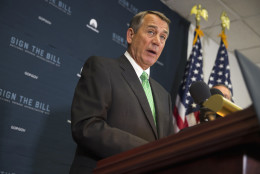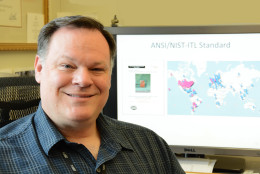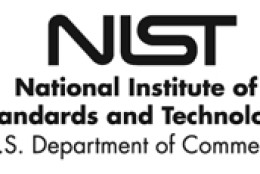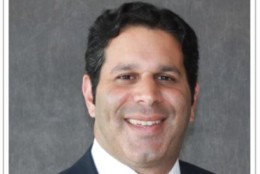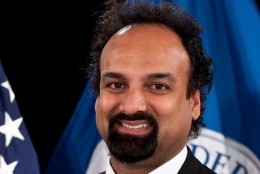National Institute of Standards and Technology
-
The FCC becomes the latest agency to fully move to the more secure protocol. NIST's scorecard shows agency progress over the last decade.
December 14, 2015 -
The chief of OMB's new cyber unit says agencies have paid a lot of attention to preventing cyber breaches, but not enough to recovering from them.
November 30, 2015 -
NIST last summer launched what it calls reference data challenge. It was seeking a new app that could provide access at least one of six NIST data sets in a move toward open data. The challenge just concluded. Heather Evans is a challenge manager at NIST. She talked with Federal News Radio’s Eric White on Federal Drive with Tom Temin about the those results and what the agency has planned.
November 24, 2015 -
House Speaker John Boehner (R-Ohio) wants to make one last budget deal before he leaves Congress at the end of the week. The two-year deal is expected to designate increases in defense spending as Overseas Contingency Operations funds, and would boost civilian agency spending as well, though not at the levels President Barack Obama requested.
October 26, 2015 -
While industry is excited about the Internet of Things, agencies have shown they've been interconnecting systems and applications for years. But the Privacy Act is standing in the government's way to go further, some say.
October 12, 2015 -
Data protection using encryption won't buy much unless you design it correctly. Like, keeping the keys away from the encrypted data. It's all in NIST publication 800-57. Look it up.
September 24, 2015 -
It might seem like something out of a science fiction novel, but soon travellers might be able to quickly moving through security checkpoints just by showing their hand to a scanner. The National Institute of Standards and Technology is working with industry to bring fast, touchless fingerprint readers out of the lab and into the marketplace. The touchless technology offers unprecedented speed and a hygienic alternative to conventional fingerprint readers. Michael Garris is a Biometric Senior Scientist at NIST. He told the Federal Drive with Tom Temin that the scanners you touch are okay.
September 22, 2015 -
We turn next to a project of the National Institute of Standards and Technology. It's working to incorporate data from a federal, personal identification verification card, or PIV card, right into your mobile device. Federal Drive host Tom Temin spoke with the principles on this project. Vernon Lee is the Chief Technical Officer of Microsoft Civilian, Hildy Ferraiolo is a computer scientist at NIST, and Chris Edwards is the CTO at Intercede.
September 21, 2015 -
Attorney Bob Metzger with Rogers Joseph O'Donnell, PC, joins host Roger Waldron for a wide ranging discussion of the federal government's cybersecurity policies and regulations including the new DFARS cyber rule. September 15, 2015
September 18, 2015 -
Sol Cates, chief security officer for Vormetric, argues that while new policies and regulations are important, the answer to an organization’s cybersecurity problems starts with making a decision to dedicating more resources to solutions and less to filling out forms.
September 15, 2015 -
A real revolution is what Nobel Prize Laureate and fellow at the National Institute of Standards and Technology William Phillips calls the field of atomtronics. He applauded the work of NIST physicist Gretchen Campbell in that field. Campbell is a Service to America Medal finalist in the Call to Service category. She says the field of atomtronics is still sort of theoretical.
September 04, 2015 -
COMMENTARY: Ron Gula, the CEO of Tenable Network Security, makes the case for CIOs not to get overwhelmed by all the security rules and requirements and instead to focus on a few areas that can make a big difference.
August 18, 2015 -
The Office of Management and Budget just released new guidance on protecting non-sensitive information from federal contractors. The guidance would require contractors follow National Institute for Standards and Technology standards for protecting their information.
August 17, 2015 -
Federal contractors have new guidance for protecting government information from the CIO and CAO Councils. Contractors will have to comply with some of the same standards agencies do. Jeremy Grant is managing director at the Cheroff Group and former director of the National Strategy for Trusted Identities in Cyberspace at NIST. He tells In Depth with Francis Rose what this means for contractors who will have to comply with these NIST standards.
August 13, 2015 -
New guidance on protecting non-sensitive information from federal contractors is out from the CIO and CAO Councils. It would require that contractors follow a specific NIST Special Publication for protecting their information. The Office of Management and Budget is asking agencies and vendors now for feedback. Final guidance is expected later in the fall. Nick Nayak is former chief procurement officer at the Homeland Security Department. He tells In Depth with Francis Rose that the councils are looking to address incident reporting, information system assessments, and information security continuous monitoring.
August 12, 2015




